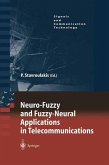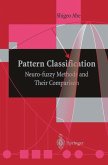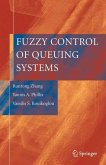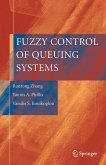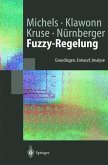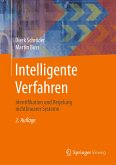This book introduces a dynamic, on-line fuzzy inference system. In this system membership functions and control rules are not determined until the system is applied and each output of its lookup table is calculated based on current inputs. The book describes the real-world uses of new fuzzy techniques to simplify readers' tuning processes and enhance the performance of their control systems. It further contains application examples.
The series Advances in Industrial Control aims to report and encourage technology transfer in control engineering. The rapid development of control technology has an impact on all areas of the control discipline. New theory, new controllers, actuators, sensors, new industrial processes, computer methods, new applications, new philosophies , new challenges. Much of this development work resides in industrial reports, feasibility study papers and the reports of advanced collaborative projects. The series offers an opportunity for researchers to present an extended exposition of such new work in all aspects of industrial control for wider and rapid dissemination. In the mid-1960s and contemporary with Kalman's pioneering papers on sta- space models and optimal control, L.A. Zadeh began publishing papers on "fuzzy sets". It took another decade before the fuzzy-logic controller due to Mamdani and Assilion was reported in the literature (ca. 1974), and now the fuzzy-logic control paradigm is entering its fifth decade of development and application. Thus, this new Advances in Industrial Control monograph edited by Ying Bai, Hanqi Zhuang and Dali Wang on fuzzy-logic control and its practical application comes as a timely reminder of the wide range of problems that can be solved by this continually evolving methodology.
The series Advances in Industrial Control aims to report and encourage technology transfer in control engineering. The rapid development of control technology has an impact on all areas of the control discipline. New theory, new controllers, actuators, sensors, new industrial processes, computer methods, new applications, new philosophies , new challenges. Much of this development work resides in industrial reports, feasibility study papers and the reports of advanced collaborative projects. The series offers an opportunity for researchers to present an extended exposition of such new work in all aspects of industrial control for wider and rapid dissemination. In the mid-1960s and contemporary with Kalman's pioneering papers on sta- space models and optimal control, L.A. Zadeh began publishing papers on "fuzzy sets". It took another decade before the fuzzy-logic controller due to Mamdani and Assilion was reported in the literature (ca. 1974), and now the fuzzy-logic control paradigm is entering its fifth decade of development and application. Thus, this new Advances in Industrial Control monograph edited by Ying Bai, Hanqi Zhuang and Dali Wang on fuzzy-logic control and its practical application comes as a timely reminder of the wide range of problems that can be solved by this continually evolving methodology.
From the reviews:
"The book is organized as follows. The first four chapters 'introduce' fuzzy controllers ... . The remainder of the text covers applications, including noise suppression in laser tracking, medical engineering, flight control, and data mining. ... For a reader desiring a collection on advanced industrial FST applications, this text is adequate. The examples are fresh and fairly broad. Few readers outside this group will find this book useful. ... the reader is encouraged to investigate fuzzy methodology." (J. Douglas Barrett, Technometrics, Vol. 49 (4), 2007)
"This volume provides a systematic review of recent fuzzy-logic control applications. ... the volume has a healthy proportion of chapters with results from practical implementations of fuzzy-logic control. ... will be of considerable interest to all those involved in the development and application of the fuzzy-logic controller field. Industrial engineers and academic researchers should find the volume a useful indicator of the maturity of the fuzzy-logic controller paradigm and a valuable resource for exploring the potential of these controllers for industrial applications." (George S. Stavrakakis, Vol. 1135 (13), 2008)
"The book is organized as follows. The first four chapters 'introduce' fuzzy controllers ... . The remainder of the text covers applications, including noise suppression in laser tracking, medical engineering, flight control, and data mining. ... For a reader desiring a collection on advanced industrial FST applications, this text is adequate. The examples are fresh and fairly broad. Few readers outside this group will find this book useful. ... the reader is encouraged to investigate fuzzy methodology." (J. Douglas Barrett, Technometrics, Vol. 49 (4), 2007)
"This volume provides a systematic review of recent fuzzy-logic control applications. ... the volume has a healthy proportion of chapters with results from practical implementations of fuzzy-logic control. ... will be of considerable interest to all those involved in the development and application of the fuzzy-logic controller field. Industrial engineers and academic researchers should find the volume a useful indicator of the maturity of the fuzzy-logic controller paradigm and a valuable resource for exploring the potential of these controllers for industrial applications." (George S. Stavrakakis, Vol. 1135 (13), 2008)



